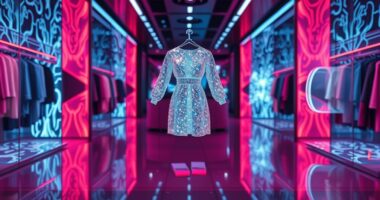Blue light blocking glasses are popular for reducing eye strain and improving sleep, but scientific evidence is limited and mixed. While some studies suggest they may help with fatigue and circadian rhythms, long-term benefits aren’t confirmed, and individual results vary. If you spend many hours in front of screens or experience discomfort, these glasses might help, but they shouldn’t be the only solution. Want to understand whether they’re worth your investment? Keep exploring more insights below.
Key Takeaways
- Scientific evidence on blue light glasses shows potential benefits for sleep and eye strain, but long-term effects are still uncertain.
- Blue light blocking glasses use special coatings to filter blue light without distorting vision or colors.
- Many benefits reported may be influenced by placebo effects or user expectations, with limited high-quality long-term studies.
- They can be a helpful complement to good screen habits but should not replace practical eye health practices.
- Their stylish design makes them popular as both functional health aids and fashionable accessories.
What Is Blue Light and Why Is It Controversial?
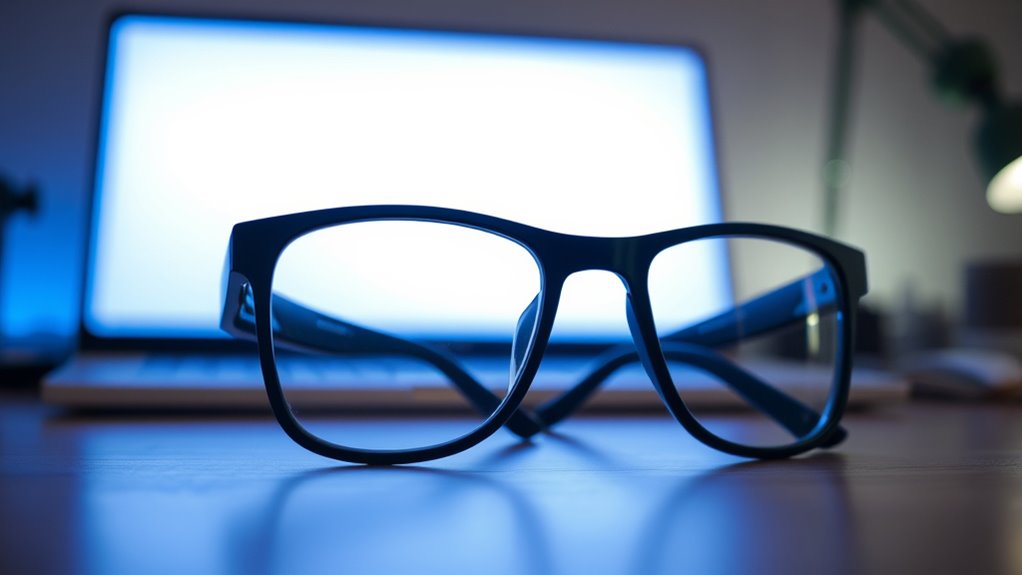
What exactly is blue light, and why does it spark controversy? Blue light is a high-energy visible light emitted by screens like smartphones, computers, and tablets. Some people worry because prolonged exposure might cause eye strain and disrupt sleep patterns, raising questions about UV protection and eye health. Others see blue light glasses as a fashionable statement, blending style with function. While these glasses often feature trendy frames, their real purpose is to filter out potentially harmful blue light and reduce eye fatigue. The controversy stems from whether blue light truly poses a health risk or if the concerns are overblown. Additionally, research into the benefits of blue light filtering is ongoing, and some experts suggest that more evidence is needed to confirm the extent of blue light’s impact on health. Regardless, many are drawn to the idea of protecting their eyes while making a style statement.
How Do Blue Light Blocking Glasses Work?
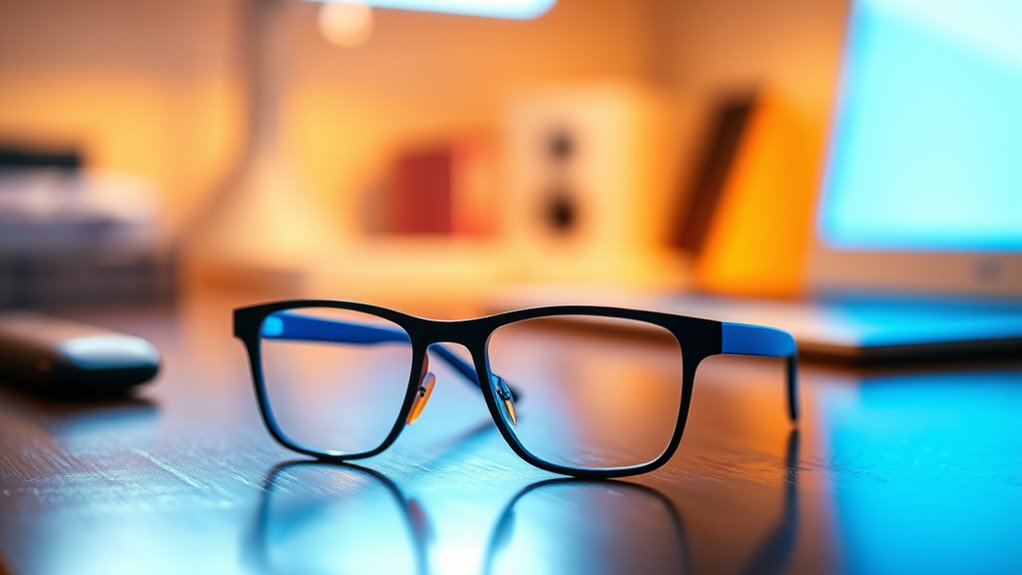
Blue light blocking glasses work by using specially coated lenses that filter out a significant portion of blue light emitted from screens. These lenses are designed through specialized manufacturing processes, ensuring they effectively reduce blue light exposure without distorting colors. As fashion trends evolve, designers incorporate stylish frames to make these glasses appealing, blending health benefits with aesthetics. The coating’s composition varies, with some glasses using tinted filters, while others use clear, nearly invisible layers. This process doesn’t affect your vision or clarity. Instead, it creates a barrier that absorbs or reflects blue light, helping to prevent eye strain and potential disruptions to your sleep cycle. Additionally, color accuracy in the lenses can influence how true-to-life the displayed images appear, further enhancing visual comfort. By understanding how these glasses work, you can decide if they fit your style and health needs.
Scientific Evidence Supporting Blue Light Glasses
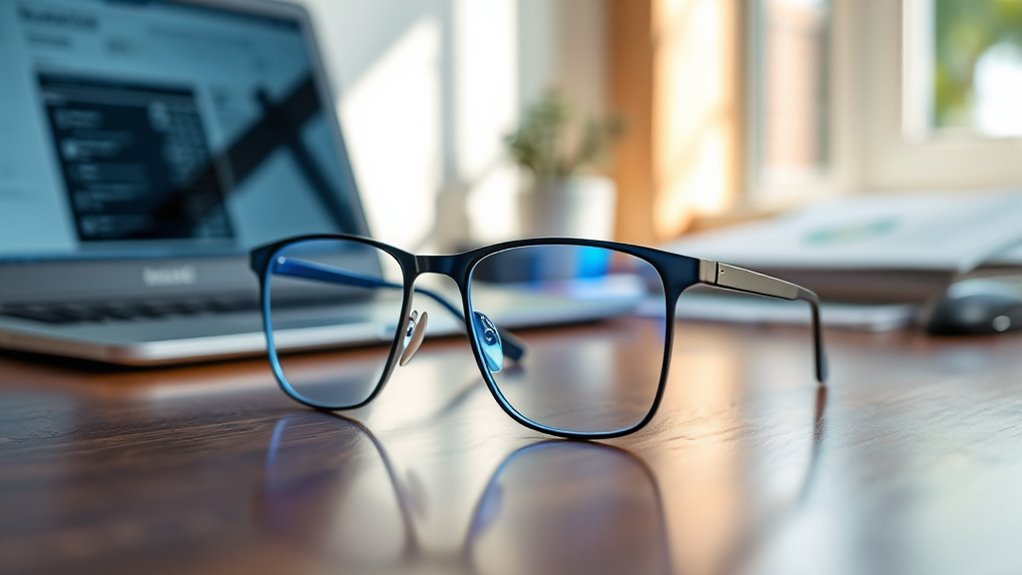
Research shows that blue light glasses can improve sleep patterns by reducing exposure before bedtime. They also help decrease eye strain during long screen sessions and support better circadian rhythm alignment. These findings suggest there’s solid scientific support for using blue light blocking glasses.
Sleep Pattern Improvement
Scientific studies have shown that wearing blue light blocking glasses in the evening can considerably improve sleep patterns. Blue light from screens interferes with your body’s natural production of melatonin, a hormone that regulates sleep. When exposed to blue light late in the day, sleep disruption occurs, making it harder to fall asleep and reducing sleep quality. By blocking blue light, these glasses help your body maintain normal melatonin levels, promoting better sleep onset and duration. Research indicates that users of blue light blocking glasses experience fewer awakenings during the night and wake feeling more rested. Additionally, understanding the importance of timely resolution in financial disputes can help reduce overall stress and improve decision-making during your health and wellness routines. This scientific evidence supports the idea that wearing these glasses in the evening can be an effective strategy for enhancing your sleep pattern, especially if you spend significant time on screens before bedtime.
Eye Strain Reduction
Because prolonged exposure to screen time can cause significant eye discomfort, many people turn to blue light blocking glasses for relief. These glasses help reduce eye strain by filtering out harmful blue light, which can cause fatigue and discomfort after hours of screen use. Scientific studies show that wearing blue light glasses decreases symptoms like dryness, headaches, and blurred vision. In addition to their functional benefits, some models offer UV protection, shielding your eyes from outdoor glare. Beyond eye health, these glasses can also serve as a fashion statement, allowing you to express your style while protecting your vision. Incorporating blue light filtering technology into your daily routine can further enhance the protective benefits of these glasses. By minimizing strain and protecting your eyes, blue light blocking glasses support your comfort during long digital sessions. They’re a practical, stylish solution backed by scientific evidence.
Circadian Rhythm Alignment
Blue light blocking glasses don’t just ease eye strain; they also help regulate your body’s internal clock. By reducing exposure to blue light in the evening, these glasses support circadian rhythm alignment, making it easier to fall asleep and wake refreshed. Excess blue light can cause melatonin suppression, disrupting your natural sleep cycle. Over time, this disturbance may impact retinal health, increasing the risk of damage to light-sensitive cells in your eyes. Wearing blue light glasses in the evening minimizes this suppression, promoting healthier melatonin production. As a result, your sleep quality improves, and your body’s internal clock stays synchronized with your environment. Scientific evidence supporting blue light glasses highlights how they are more than just eye comfort tools—they play an essential role in maintaining your overall circadian health. Additionally, understanding the effects of blue light exposure can help you make informed choices about protecting your eyes and sleep patterns.
Criticisms and Limitations of Current Research

While studies on blue light blocking glasses show promise, there are notable limitations to contemplate. You should be aware that long-term data is scarce, and the quality of current research varies widely. Additionally, some improvements may be influenced by placebo effects rather than the glasses themselves. Furthermore, decluttering strategies can help create a more organized environment that may enhance focus and reduce stress during screen time.
Limited Long-term Data
Despite growing interest in blue light blocking glasses, research on their long-term effects remains limited. Most studies focus on short-term benefits, leaving questions about their impact over years. Without extensive long-term data, it’s hard to determine if blue light filters truly improve eye health or prevent age-related eye conditions. You might notice immediate relief from eye strain, but the lasting benefits are uncertain. Skeptics argue that current evidence doesn’t definitively prove these glasses protect your vision over the years. While some users report positive results, the lack of thorough long-term studies means you should be cautious. Until more data becomes available, it’s difficult to confirm whether these glasses are a lasting solution for preserving eye health or simply a temporary fix. Additionally, the protective styling benefits of such accessories are well recognized in hair care but have not been extensively studied for their potential impact on eye health over time.
Study Quality Variability
The quality of current research on blue light blocking glasses varies considerably, raising concerns about the reliability of findings. Many studies differ in study design, with some lacking control groups or using small sample sizes, which weakens their conclusions. Additionally, research funding sources can influence outcomes, leading to potential bias. Some studies are sponsored by manufacturers of blue light glasses, raising questions about objectivity. The inconsistency in methodologies and quality makes it difficult to draw definitive conclusions about their benefits. Without standardized protocols or rigorous peer review, the evidence remains fragmented and sometimes questionable. Furthermore, the dog breed used in studies can significantly impact results, as different breeds may respond differently to interventions. As a result, you should approach claims about the effectiveness of blue light blocking glasses with caution, recognizing that the current research landscape is marked by significant variability.
Placebo Effect Concerns
One major concern with current research on blue light blocking glasses is the potential influence of the placebo effect. If users believe the glasses will improve their sleep or reduce eye strain, they might report benefits regardless of actual effectiveness. This fuels consumer skepticism and makes it difficult to determine true benefits. Researchers struggle to separate genuine effects from psychological expectations. The table below highlights key factors influencing placebo effects:
| Factor | Explanation | Impact on Research |
|---|---|---|
| User Bias | Expectations shape perceptions | Skews results |
| Study Design | Lack of control groups | Overestimates benefits |
| Participant Belief | Belief in product efficacy | Enhances perceived effects |
| Sample Size | Small samples limit accuracy | Reduces reliability |
| Blinding | Awareness of intervention affects outcomes | Challenges validity |
Addressing these issues is vital for accurate conclusions. Additionally, understanding the psychological factors at play can help researchers design more rigorous studies to evaluate true efficacy.
Potential Benefits for Screen Time Users

If you spend a significant amount of time in front of screens, blue light blocking glasses can offer notable benefits. They may help reduce eye strain, improve sleep quality, and decrease headaches caused by prolonged exposure. While some blue light myths suggest they completely eliminate eye problems, these glasses are more about mitigation than cure. Many people also wear them as fashion accessories, blending function with style. Wearing these glasses during screen time can help you feel more comfortable and alert, especially late at night. Additionally, proper lens technology can enhance their effectiveness and comfort. Although research is ongoing, many users report feeling less fatigued and experiencing better rest. Keep in mind, these benefits vary individually, but for frequent screen users, blue light blocking glasses can be a practical addition to your routine.
Are There Any Risks or Downsides?
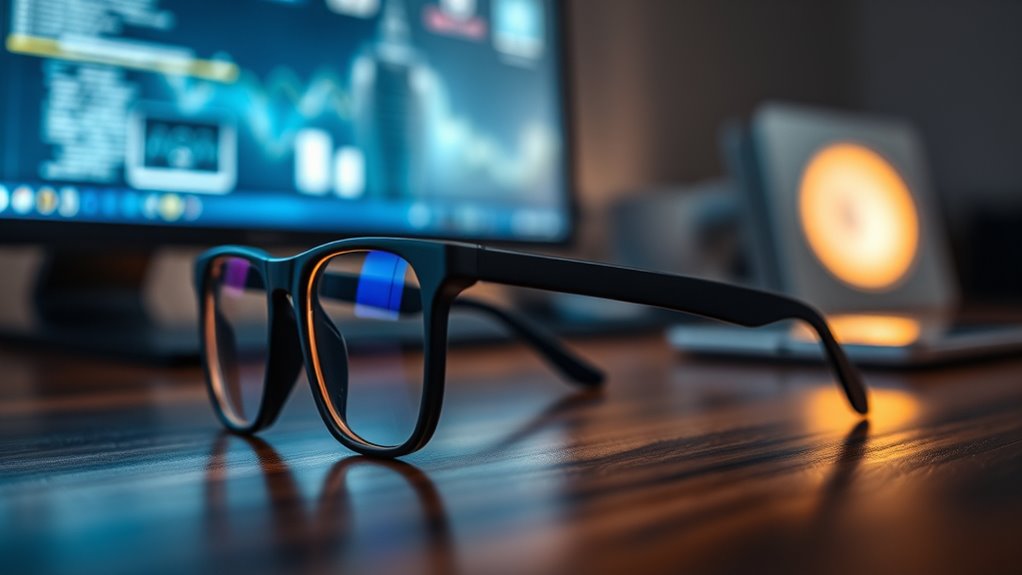
While blue light blocking glasses are generally helpful, there are some risks to contemplate. You might experience eye strain if the glasses cause your eyes to focus harder or feel uncomfortable. Additionally, they could potentially disrupt your sleep patterns if they alter your natural circadian rhythms.
Potential Eye Strain Effects
Although blue light blocking glasses are generally considered safe, some users may experience minor eye strain or discomfort after prolonged use. This can happen if your eyes adapt poorly to the glasses or if you’re already prone to digital eye issues. Wearing them for extended periods might sometimes cause subtle eye fatigue or a sensation of dryness, especially if your eyes are sensitive. It’s important to take regular breaks from screens and ensure proper lighting to minimize strain. While blue light filters aim to reduce digital eye stress, they aren’t a cure-all. If you notice persistent discomfort or worsening symptoms, consult an eye care professional. Overall, most users tolerate these glasses well, but paying attention to how your eyes respond is key.
Possible Sleep Disruptions
Blue light blocking glasses are designed to reduce eye strain during screen time, but some users worry about potential impacts on sleep. While these glasses offer UV protection and can help improve sleep quality by filtering blue light, they aren’t foolproof. If you wear them late at night, your body might still produce melatonin naturally, but excessive reliance on them could lead to a false sense of security. Additionally, some people see glasses as a fashion statement, which might distract from their actual purpose. If you’re concerned about sleep disruptions, it’s best to combine wearing these glasses with good sleep hygiene. Remember, they’re a helpful tool but shouldn’t replace other healthy habits for *ideal* rest.
Comparing Blue Light Glasses to Other Eye Care Strategies
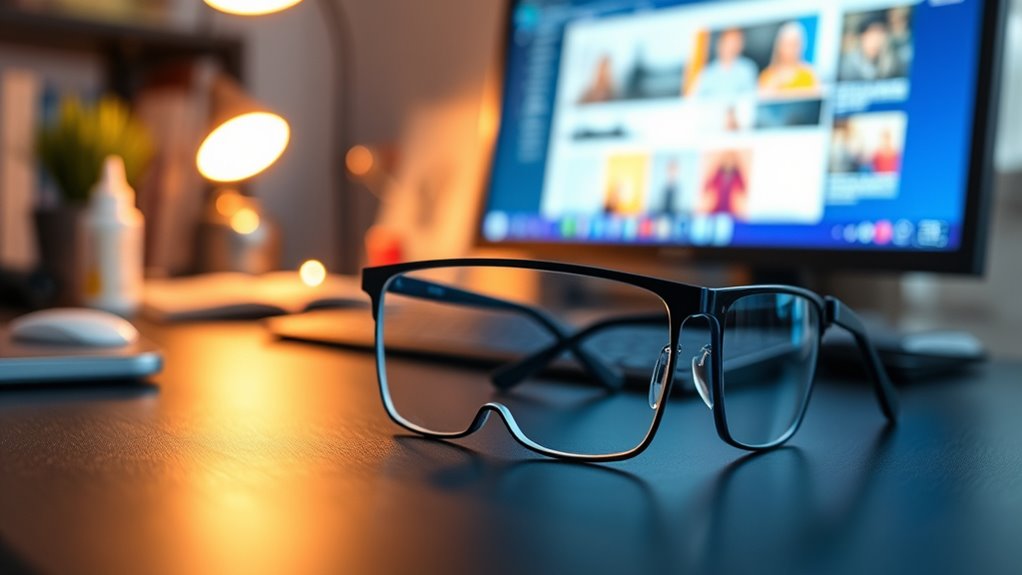
When it comes to protecting your eyes from digital strain, blue light blocking glasses are just one option among several strategies. You might have heard blue light myths that downplay their effectiveness, but they’re not the only eye care alternatives available. To compare:
- Adjusting screen brightness and contrast reduces eye fatigue without glasses.
- Following the 20-20-20 rule—every 20 minutes, look 20 feet away for 20 seconds—relieves eye strain.
- Maintaining proper ergonomic setup minimizes discomfort and long-term issues.
While blue light glasses can help, they shouldn’t replace these practical steps. Understanding eye care alternatives helps you make informed decisions instead of relying solely on hype or misconceptions about blue light myths.
Who Should Consider Using Them?

If you spend long hours looking at screens daily, blue light blocking glasses might be worth considering. They’re especially useful if you experience eye strain, headaches, or disrupted sleep. Fashion trends have made these glasses more stylish, so you don’t have to sacrifice looks for function. Cultural perceptions also influence who uses them; many see them as a health-conscious accessory rather than just a tech gadget. If you work late into the night or have a job that involves extensive screen time, these glasses can help protect your eyes. They’re suitable for students, remote workers, gamers, or anyone concerned about digital eye strain. Ultimately, if screens dominate your day, blue light glasses could be a practical addition to your routine.
Price Range and What to Look for When Buying
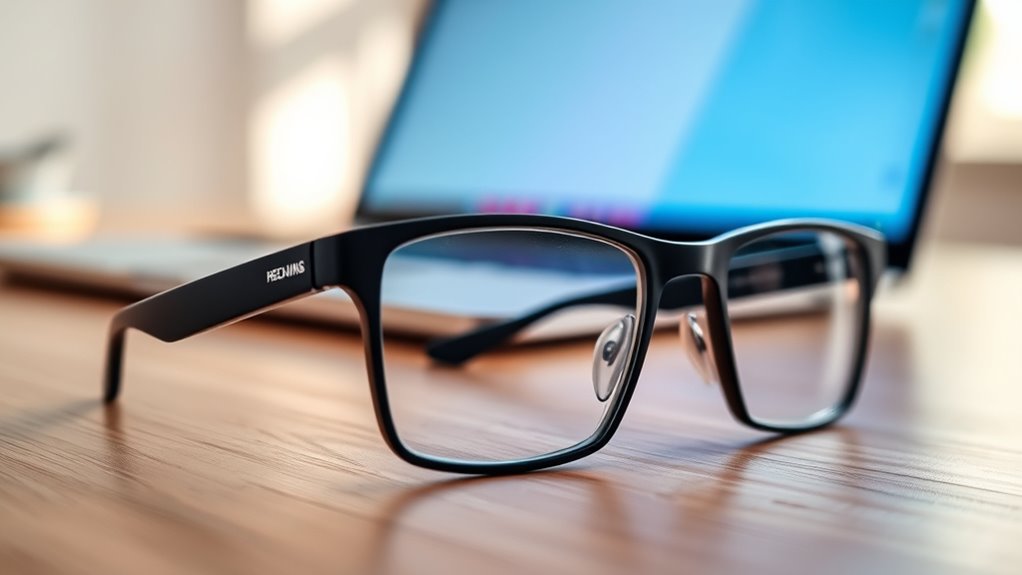
The price of blue light blocking glasses can vary widely, so it’s important to know what to expect before making a purchase. Price considerations depend on factors like brand, quality, and features. When shopping, focus on these key aspects:
- Product features: Look for lenses with high-quality blue light filtering and anti-reflective coatings.
- Frame durability: Ensure the frame is comfortable and built to last.
- Price range: Budget options can start around $20, while premium glasses may cost $100 or more.
Balancing cost with product features helps you find glasses that suit your needs without overspending. Remember, investing in quality can mean better protection and comfort, making your purchase more worthwhile.
Making an Informed Decision: Are They Worth It?

Deciding whether blue light blocking glasses are worth the investment depends on your specific needs and habits. If you spend hours in front of screens, they might reduce eye strain and improve sleep. However, consider whether they fit your lifestyle and preferences. Some see them as a fashion trend or a stylish fashion accessory, making them appealing beyond health benefits. To help you decide, here’s a quick comparison:
| Benefit | Consideration | Style Impact |
|---|---|---|
| Eye strain relief | Cost vs. frequency of use | Fashion statement or accessory |
| Sleep improvement | Long-term health impact | Trendy or functional |
| Screen comfort | Personal aesthetic taste | Adds to your wardrobe |
| Eye protection | Actual blue light filtering | Complements outfits |
| Cost-effectiveness | Budget considerations | Fashion statement or necessity |
Evaluate these factors to determine if they’re right for you.
Frequently Asked Questions
Do Blue Light Glasses Improve Sleep Quality Beyond Screen Protection?
You might wonder if blue light glasses genuinely improve sleep quality beyond just protecting your eyes. While they can help reduce blue light exposure, their impact on sleep improvement varies. Some studies suggest they support circadian rhythms, leading to better sleep, especially if worn in the evening. However, individual results differ, so while they may aid your sleep, they’re not a guaranteed fix for all sleep issues.
Can Blue Light Glasses Prevent Long-Term Eye Damage?
You might wonder if blue light glasses can prevent long-term eye damage. While they don’t offer UV protection, they can help reduce digital eye strain caused by prolonged screen time. By filtering blue light, these glasses may lessen eye discomfort, but there’s limited evidence they prevent permanent damage. To protect your eyes long-term, also follow good habits like taking breaks and adjusting screen brightness.
Are There Specific Brands Recommended by Eye Health Professionals?
Did you know that 60% of eye care professionals recommend specific blue light blocking brands? When choosing glasses, look for those with professional endorsements, as they guarantee quality and effectiveness. While some brands are popular, it’s best to consult an eye specialist for personalized recommendations. Trusted brands often undergo rigorous testing, so investing in the right pair can help protect your eyes during long screen time.
How Do Blue Light Glasses Affect People With Existing Eye Conditions?
If you have existing eye conditions, blue light glasses can help alleviate eye strain caused by prolonged screen time. They’re generally compatible with prescriptions, so you won’t need to give up your current glasses. While they won’t cure underlying issues, wearing them may ease discomfort and improve your visual comfort. Always consult your eye care professional to ensure they’re suitable for your specific condition and needs.
Are Blue Light Glasses Effective for Children and Teenagers?
You wonder if blue light glasses work for children and teenagers. They can help reduce eye strain from screens, promoting child safety and better sleep. While some see them as a fashion trend, their protective benefits shouldn’t be disregarded. However, it’s best to choose glasses designed for younger eyes and encourage healthy screen habits. Always consult an eye care professional to ensure they’re suitable for your child’s needs.
Conclusion
Ultimately, blue light blocking glasses are like a lighthouse guiding your eyes through the fog of screen time. While they may not be a magic bullet, they can offer relief and help protect your vision if you spend hours on devices. Consider your needs, research your options, and make an informed choice. After all, your eyes deserve the best shield you can give them—because clear vision is the true treasure.




